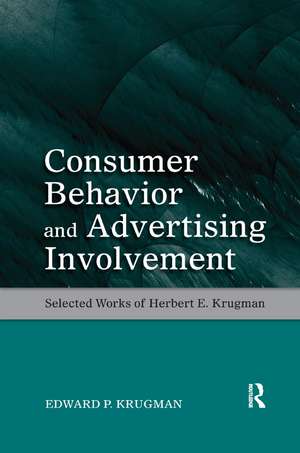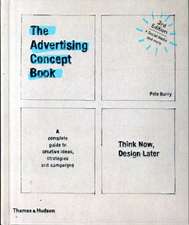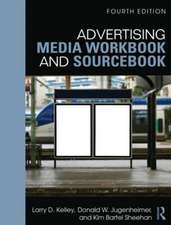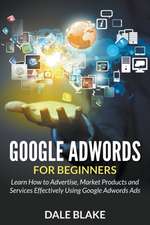Consumer Behavior and Advertising Involvement: Selected Works of Herbert E. Krugman: Marketing and Consumer Psychology Series
Autor Edward P. Krugmanen Limba Engleză Paperback – 18 oct 2018
| Toate formatele și edițiile | Preț | Express |
|---|---|---|
| Paperback (1) | 469.34 lei 6-8 săpt. | |
| Taylor & Francis – 18 oct 2018 | 469.34 lei 6-8 săpt. | |
| Hardback (1) | 1012.69 lei 6-8 săpt. | |
| Taylor & Francis – 28 mai 2008 | 1012.69 lei 6-8 săpt. |
Preț: 469.34 lei
Nou
Puncte Express: 704
Preț estimativ în valută:
89.81€ • 93.54$ • 74.87£
89.81€ • 93.54$ • 74.87£
Carte tipărită la comandă
Livrare economică 28 martie-11 aprilie
Preluare comenzi: 021 569.72.76
Specificații
ISBN-13: 9781138384309
ISBN-10: 1138384305
Pagini: 354
Dimensiuni: 152 x 229 x 19 mm
Greutate: 0.45 kg
Ediția:1
Editura: Taylor & Francis
Colecția Routledge
Seria Marketing and Consumer Psychology Series
Locul publicării:Oxford, United Kingdom
ISBN-10: 1138384305
Pagini: 354
Dimensiuni: 152 x 229 x 19 mm
Greutate: 0.45 kg
Ediția:1
Editura: Taylor & Francis
Colecția Routledge
Seria Marketing and Consumer Psychology Series
Locul publicării:Oxford, United Kingdom
Public țintă
ProfessionalCuprins
Editor’s Note. Foreword by William D. Wells. Part 1. Themes. 1. The Learning of Tastes. 2. The Learning of Consumer Preference. 3. An Application of Learning Theory to TV Copy Testing. 4. Some Applications of Pupil Measurement. 5. A Comparison of Physical and Verbal Responses to Television Commercials. 6. The Impact of Television Advertising: Learning Without Involvement. 7. The Measurement of Advertising Involvement. 8. Psychological Perspectives in Marketing Strategy. 9. Processes Underlying Exposure to Advertising. 10. Television and Trust in Rationality. 11. What’s a Krugman Connection? Part 2. Brain Waves. 12. Flicker Fusion Frequency as a Function of Anxiety Reaction: An Exploratory Study. 13. Passive Learning from Television. 14. Mass Media and Mental Maturity. 15. "Temporary" Effects of Communication. 16. Brain Wave Measures of Media Involvement. 17. Why Three Exposures May Be Enough. 18. What Makes Advertising Effective? 19. Memory Without Recall, Exposure Without Perception. 20. Toward an Ideal TV Pre-Test. 21. The Two Brains: New Evidence on TV Impact. 22. Media Imagery: Perception After Exposure. 23. A Question of Speed of Communications. 24. Sustained Viewing of Television. 25. The Effective Use of Physiological Measurement in Advertising Research. 26. Next Steps - A Productive Approach to Measuring Effective Frequency. 27. The Two Futures of Advertising Research: Images vs. Messages. 28. Beyond Recall. 29. Measuring Memory: An Industry Dilemma. 30. A Personal Retrospective on the Use of Physiological Measures of Advertising Response. Part 3. Corporate Advertising. 31. Adapting Existing Survey Data Banks to Social Indicator Purposes. 32. Innovations in Public Opinion Research. 33. Public Attitudes Toward Private Enterprise and Business. 34. How to Misinterpret Public Opinion Research and Underestimate the Potential of Corporate Advertising. 35. Understanding Public Response to Massive New Technologies. 36. Measuring Progress. 37. Tracking the Effects of Corporate Advertising. 38. Corporate Advertising as "Thought Provoking" Messages. 39. Repetition Revisited: Application of the Three Exposure Theory to Corporate Advertising. 40. Television Program Interest and Commercial Interruption. Part 4. Methods and Observations. 41. The "Draw a Supermarket" Technique. 42. The Role of Magazines in America: Today and Tomorrow. 43. Fast Learning and Slow Forgetting of Advertising Campaigns. 44. Limits of Attention to Advertising. 45. High Resolution Television and Video Games of the Future: Some Psychological Implications. 46. Some Consequences of High Definition Television. 47. Consumer Behavior. 48. Sociology and Consumer Behavior. 49. Pavlov’s Dog and the Future of Consumer Psychology.
Notă biografică
From 1967 to his retirement in 1983, Herbert E. Krugman was manager of corporate public opinion research at the General Electric Company. He was previously research vice president for Marplan, for Ted Bates Advertising, and for the indutrial design firm of Raymond Loewy.
Dr. Krugman received his Ph.D. from Columbia University in 1952 and his B.S.S. from CCNY in 1942. He is past-president of the American Association for Public Opinion Research, of the Division of Comsumer Psychology of the American Psychological Association, and of the Market Research Council of New York.
He has served on the faculties of Yale, Princeton and Columbia Universities and has been a trustee of the Marketing Science Institute in Cambridge, a director of the Advertising Research Foundation and chairman of the Research Policy Committee of the Association of National Advertisers.
Dr. Krugman received his Ph.D. from Columbia University in 1952 and his B.S.S. from CCNY in 1942. He is past-president of the American Association for Public Opinion Research, of the Division of Comsumer Psychology of the American Psychological Association, and of the Market Research Council of New York.
He has served on the faculties of Yale, Princeton and Columbia Universities and has been a trustee of the Marketing Science Institute in Cambridge, a director of the Advertising Research Foundation and chairman of the Research Policy Committee of the Association of National Advertisers.
Recenzii
" I think the compilation of Krugman’s work is great. Where can I buy one right now?? The breadth of his topics is wonderful, touching on many important persuasion topics in Consumer Behavior, media and advertising. His work spans almost four decades, going back to the post war days and propaganda and forward to the media and advertising studies in the 70s and 80s. I would think this would be a great reference book on a number of persuasion topics with excellent cross referencing possibilities. I don’t think the consumer scientists of today are aware of the breadth of his contribution to this body of knowledge." -David Schumann, University of Tennesee
"Herbert Krugman had the enduring belief that social science research methods, including physiological responses measured in the laboratory, predict important behavior in the outside world. Another is an underlying assumption that academic social science theories, especially theories from academic psychology, provide useful guidance to managers who govern day to day events. The chapters in this book report efforts to apply social science theories and methods in studies of consumer preferences?" -William D. Wells, University of Minnesota
"Graduate students, new and established practitioners, and contemporary researchers will benefit from an examination of how Herbert Krugman addresses fundamental issues associated with understanding, predicting, and influencing consumer behavior" - Curtis P. Haugtvedt, The Ohio State University
"Herbert Krugman had the enduring belief that social science research methods, including physiological responses measured in the laboratory, predict important behavior in the outside world. Another is an underlying assumption that academic social science theories, especially theories from academic psychology, provide useful guidance to managers who govern day to day events. The chapters in this book report efforts to apply social science theories and methods in studies of consumer preferences?" -William D. Wells, University of Minnesota
"Graduate students, new and established practitioners, and contemporary researchers will benefit from an examination of how Herbert Krugman addresses fundamental issues associated with understanding, predicting, and influencing consumer behavior" - Curtis P. Haugtvedt, The Ohio State University
















